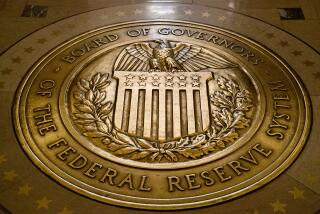Businesswoman Chosen to Lead Commerce Dept.
- Share via
WASHINGTON — President Bush on Thursday nominated businesswoman Barbara Hackman Franklin to become secretary of commerce and, under continuing pressure over the nation’s ailing economy, said he remains baffled by the nation’s pervasive sense of gloom.
Although overall unemployment is significantly less severe than it was during the 1981-1982 downturn, consumer confidence has plummeted to its lowest levels in more than a decade.
“I haven’t really been able to sort out why there has been this degree of pessimism,” Bush told reporters. However, he speculated that it might be because white-collar workers have been hit harder during this recession than they were in previous ones.
Franklin, a 51-year-old Republican activist who owns a management consulting firm in Washington, would replace Bush confidant Robert A. Mosbacher as head of the federal department charged with opening business opportunities for U.S. firms overseas. Mosbacher is leaving the post next month to become general chairman of Bush’s reelection campaign.
In introducing her, Bush noted that “currently, exports are our strong suit and . . . we must continue to press hard to open more markets to quality American goods and services.”
However, he declined to state specifically what he hopes to gain with his upcoming trip to Japan, in which he will be accompanied by a delegation of U.S. business executives. The group plans to press for changes in Japanese trade policies that the United States contends are unfair.
At the end of the trip next month, the Japanese “will have a much clearer feel for the state of the U.S. economy and what the President and some business leaders think needs to be done to improve the state of the U.S. economy,” Bush said.
The delegation will include chief executives of this country’s Big Three auto makers, who have asked Washington for more protection from Japanese imports. At a time when General Motors is planning to eliminate 74,000 jobs, automobiles and their parts account for three-quarters of the U.S. trade deficit with Japan.
Economic friction between the two countries has heightened in recent weeks and seems likely to get worse as Bush’s visit draws nearer. Japanese leaders initially had viewed the trip as a goodwill visit and have expressed dismay over the increasing belligerence they are hearing from Washington.
Yet, on Thursday, Japanese officials restated their longstanding opposition to a proposal, put forward in ongoing global trade negotiations, that they open up their rice market--a potentially lucrative one for California farmers.
They also announced that Japan’s November trade surplus with the United States quadrupled from the same month a year earlier, before seasonal adjustments. The increase was blamed on a slowdown in Japan’s economy, which has consumers there buying less.
Asked about his domestic economic plans, Bush refused to spell out the options that he is considering as he and his advisers put together a package to be unveiled in his State of the Union address next month. However, he said the plan will be “stimulative” and suggested that non-discretionary spending, such as entitlement programs, might be a target for his budgetary ax. Entitlement programs include Medicare, Medicaid and Social Security.
“When you take a look at some of the entitlement programs, therein lies the real expansion of government spending,” the President said. “What can be done about them? We’re talking about that right now.”
If confirmed by the Senate, Franklin will take over a department that has been at the center of a series of recent controversies, which include accusations that it overrode Pentagon objections to the sale of advanced-technology equipment to Iraq in the years before the Persian Gulf War.
Critics also have charged that the Commerce Department bungled the nation’s once-a-decade census and could leave bigger cities--where Democrats and minority groups generally have their greatest strength--underrepresented in state legislatures and Congress.
Franklin, whose nomination was applauded by a number of business groups and executives of major corporations, said she plans to act as “an advocate for American business--small business, big business, medium-sized business, start-up business, manufacturing, service, whatever kind of business we have in this country.”
She described business as “the backbone of America and really the envy of the world.” A woman who has known the President for almost two decades, Franklin last month co-chaired a fund-raiser that added almost $1.2 million to the coffers of Bush’s reelection campaign.
Franklin first entered government in 1971, when she headed the Richard M. Nixon Administration’s effort to recruit women to high-level government posts.
When the Consumer Product Safety Commission was created in 1973, she was named one of its first members. She remained there during most of the Jimmy Carter Administration.
More to Read
Get the L.A. Times Politics newsletter
Deeply reported insights into legislation, politics and policy from Sacramento, Washington and beyond. In your inbox twice per week.
You may occasionally receive promotional content from the Los Angeles Times.








